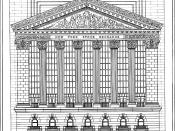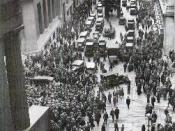When Herbert Hoover was inaugurated as the thirty-first President of the United States early in 1929, the nation was enjoying unprecedented prosperity. But by the end of the year, the stock market had crashed and the country was headed for the Great Depression. President Hoover tried to fight the Great Depression, but as he neared the end of his term, the American economy was in its worst state yet, and many fearful citizens wanted a leader who would do more to alleviate the crisis. They found that leader in Franklin D. Roosevelt, who promised the nation a "New Deal" and with that promise won the election of 1932. Roosevelt's New Deal had profound effects upon American history. Although it was intended to restore America's devastated economy, the New Deal actually did little to encourage prosperity.
Causes of the Great Depression.
Easy Credit. Although the American economy thrived in the 1920s, much of this prosperity was based on easy credit.
The Federal Reserve Bank kept interest rates low, making it easy for businesses and individuals to take out loans. This policy encouraged people to go into debt. Many people bought new homes, cars, and appliances on installment plans. Instead of paying the full price of an item at the time of purchase, they made a small down payment and then paid monthly installments over a set period of time. As long as people could buy on credit, factories kept busy and jobs were plentiful.
The stock market. The optimism of the era was nowhere more evident than at the stock exchange on Wall Street in New York City. Most factories were owned by shareholders, people who held stocks in the corporations producing the goods. As businesses prospered in the 1920s, stock dividends soared and many people invested in stocks, driving stock...



The Great Depression
A great and interesting read...well-written, easy to read...and very informative. Great research tool. Good job.
6 out of 6 people found this comment useful.